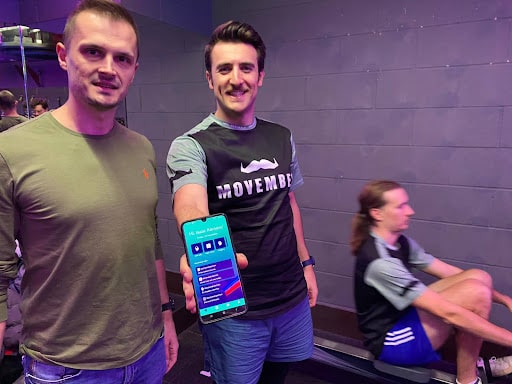Endurance Indoor World Record
Powered by Positive Self-Talk
Author: Isaac Kenyon
During November 2023 when the winter months start to creep in, mental health challenges intensify. My goal was to bring visibility to the invisible illness of poor mental health raising funds and awareness for men’s mental health with Movember charity. I built a team to do this challenge with and you can see their moustaches below.
 UK mental health is in crisis right now – and men’s mental health is particularly urgent. Men account for 3 out of 4 cases of suicide in the UK alone (ONS), and services like the NHS are frequently overburdened and unable to cope. In light of this striking issue, I decided to take on an endurance challenge familiar to me which could make the invisible appear visible and raise funds and awareness of this critical problem. While personal change is a start, mental health services in the UK need more provisions.
UK mental health is in crisis right now – and men’s mental health is particularly urgent. Men account for 3 out of 4 cases of suicide in the UK alone (ONS), and services like the NHS are frequently overburdened and unable to cope. In light of this striking issue, I decided to take on an endurance challenge familiar to me which could make the invisible appear visible and raise funds and awareness of this critical problem. While personal change is a start, mental health services in the UK need more provisions.
What I did with my team?
I currently holds records for the longest continual row on an indoor rowing machine for 83 hours solo and also another world record for 48 hours in a tandem. However, this time I wanted this challenge to focus on raising mental health awareness. The endurance challenge chosen was to break the current longest continual LWT (under 75kg in weight) indoor rowing world record for a small male-only team aged 20-29, which at the time stood at 30 hours. You can see their record on the Concept2 website. The challenge is symbolic of mental health because we will be pinned down on an indoor rowing machine for over a day with no escape until the record is complete, which will be very mentally taxing and symbolises the feeling that many with mental health issues have which is that feeling of being a prisoner in your own mind.
Our Impact
The team I built consisted of two friends PhD student Graham Moore, IT engineer Alex Pierrot and myself. Our challenge took place at ROWBOTS City of London indoor rowing studio starting at 7 am on the 24th of November and finishing at 1 pm on the 25th of November, we took turns in one-hour rotations, using a single Concept2 indoor rowing machine that was kindly donated to us from Isaac’s fitness partner Hire Fitness. The new world record we set was 30 hours, you can read about it in the 400+ publications and news pieces globally including ITV News, The Daily Mail, The Daily Telegraph, The Independent and The Evening Standard. It was heartwarming to speak with over 20 people during our challenge at ROWBOTS who not only supported us but also shared their own mental health stories and opened up to us. Some of whom had never spoken about their mental health issues before. This was inspiring to see! Our story inspired conversations about mental health, particularly among men, encouraging them to confront the stigma surrounding mental health and open up, our goal was to encourage all men to talk about mental illness “as easily as we talk about the common cold”.Sharing our mental health stories, seeking help, and managing day-to-day well-being are crucial. Coping with mental health problems is easier when done together. 30 hours of continuous rowing seems intimidating – but it’s far easier to achieve when working as part of a team. Similarly, Movember aims to lift the burden of mental health by opening up conversations and bolstering support networks.Throughout the challenge, we’ve always tried to share our stories about our mental health when we have been going through difficult times, as that is when it is most important to seek help. I worry about the quiet ones – the ones who (we) may not know have issues – and we would love it if those people could find the courage to open up like we did as things will get better.How did you accomplish this feat?
Now the key bit that makes any great idea or cause successful is the execution and the MINDSET. As a well-known world-record-breaking endurance athlete I have had my fair share of adversity and mental challenges to overcome and there are several tools that I have built over the years that get me through any difficult time I am faced with and helped build my resilience. However, there is one tool in particular that I truly rely upon, it’s so simple but often not used by people going through hard times. It is Positive Self Talk. I use this tool only when I’m in difficulty otherwise it loses its real power. During the world record attempt, I worked on my positive self-talk with the mental wellness app called Psync which brings the latest psychology tools to your phone. I used the app throughout to keep working on my positive self-talk. Psync app was born out of conservations with sports coaches and expert sport and exercise scientists. The team at Psync discovered that one universal factor affected the progress of athletes and that was how they use their mental skills. By improving the use of these skills athletes can enhance their performance and well-being. Using the tools and techniques associated with psychology is much the same as using gym equipment to improve your fitness. Why I really liked using Psync app is that all the data is anonymous and confidential and hw easy it was to use on my phone.
Is there more to Positive Self-Talk than just talking positive?
Positive self-talk, also known as affirmations or optimistic inner dialogue, involves consciously directing positive thoughts and statements toward oneself. While it may sound like a simple practice, to do it well is a skill. Its impact on mental well-being and resilience is backed by psychological and neuroscientific research.Neuroplasticity and Brain Rewiring:
Did you know that the brain can reorganise itself, a phenomenon known as neuroplasticity? Positive self-talk can contribute to this process by rewiring neural pathways. Learn more around the science behind this in Re-Origin. When you consistently focus on positive thoughts, you strengthen neural connections associated with optimism and resilience. I have been focussing on this process for years, call me an optimist or whatever it works wonders when you need it! Studies using neuroimaging techniques, such as functional magnetic resonance imaging (fMRI), have shown changes in brain activity patterns associated with positive affirmations. Manifesting positive thoughts is more than spiritual it changes your mental state.Stress Reduction and Cortisol Regulation:
When I’m in the most pressurised situations, you know those moments of deep despair like you just have broken your shoulder and all your plans for the next 2 months are bye-bye, this can cause a lot of stress! Positive self-talk can help regulate stress hormones, particularly cortisol. Chronic stress is associated with negative health outcomes, and managing cortisol levels is crucial for resilience. Research studies, including those published in the Journal of Personality and Social Psychology, have demonstrated that positive self-affirmations can buffer against the effects of stress and lower cortisol levels. My stress in times of very pressurised situations is usually lower because of the power of positive self-talk. You can read up more on this in the Medical News Today.Enhanced Problem-Solving and Cognitive Function:
There is always a different reaction to a situation and positive self-talk helps me to approach problems with a solution-focused mindset rather than getting overwhelmed by negative emotions. Studies, such as those published in the Journal of Experimental Social Psychology, have explored how positive affirmations can improve problem-solving skills and creative thinking.Emotional Regulation and Resilience:
More often than not, bad situations can bring out emotions! Positive self-talk contributes to emotional regulation, helping individuals better manage their emotional responses to challenging situations. Resilience, in this context, is the ability to bounce back from adversity. You can read more on this in The Journal of Behavioral Medicine and other publications which have highlighted the role of positive affirmations in building emotional resilience.Psychological Well-being and Positive Psychology:
One of the most important aspects of positive psychology for me is the power of how it emphasises the importance of focusing on strengths and positive aspects of life. Positive self-talk aligns with this approach, and this creates a positive psychological well-being. There have been numerous studies within the field of positive psychology have explored the benefits of positive affirmations in improving overall mental health and life satisfaction.Social Connection and Support:
It was pretty critical as a team of three sharing the rowing machine to not only engage in positive self-talk for ourselves but also each other. Positive self-talk’s influence extends beyond the individual it can also influence how individuals perceive and interact with others. A positive mindset can enhance social connections and support, which are critical for resilience. Social Psychological and Personality Science and similar journals have published research on the link between positive affirmations, social relationships, and support systems.Remember positive self-talk is not merely a feel-good practice; it has tangible effects on the brain, stress response, cognitive function, emotional well-being, and social dynamics. Incorporating positive affirmations into one’s daily routine can contribute to building resilience and navigating difficult times more effectively. Book me for a talk to learn more.
